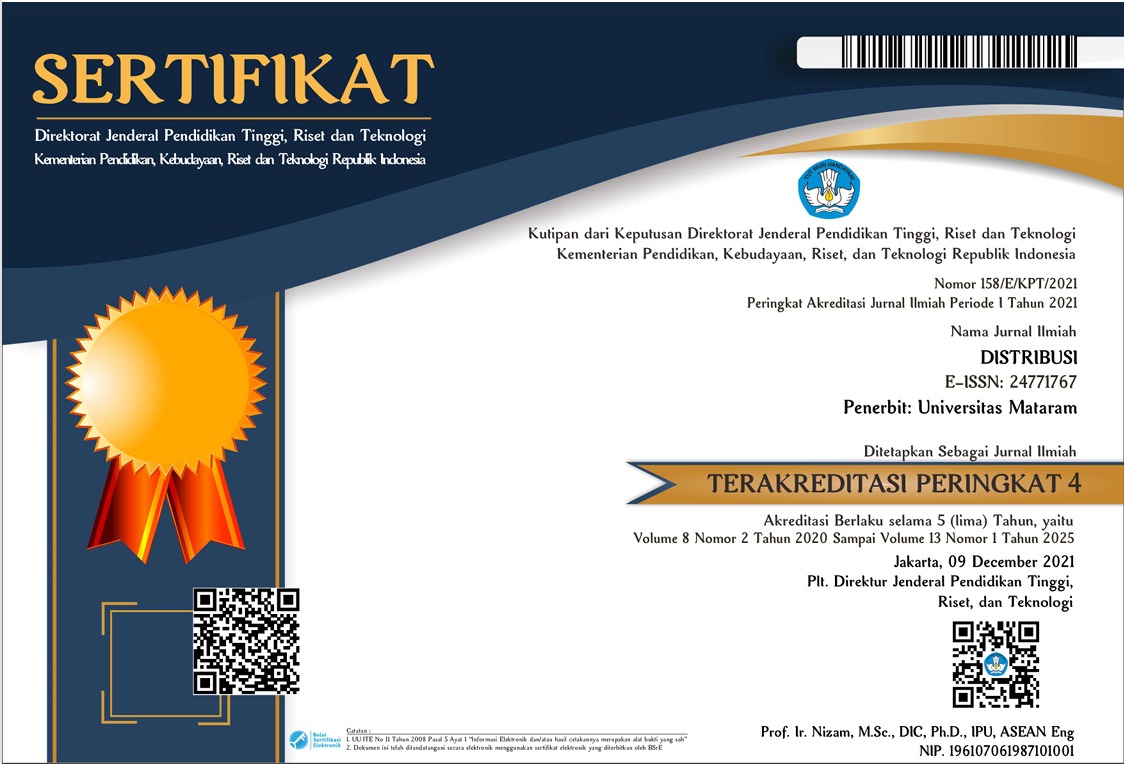EVALUASI PROGRAM INDONESIA SEHAT DENGAN PENDEKATAN KELUARGA DAN IMPLEMENTASI KEGIATAN TENAGA KESEHATAN BERSINERGI BERSAMA UNTUK MASYARAKAT SEHAT
DOI:
https://doi.org/10.29303/distribusi.v8i2.135Keywords:
Healthy Indonesia Program, Family approach, TelehealtAbstract
Indonesia Program, increase awareness, willingness, and ability to live healthy lives for everyone to improve their health status as high as possible. The healthy Indonesia program with a family approach is an effort to respond to these health development challenges. The results of the Healthy Indonesia Family Approach Program will be one of the references in planning the management of health centers.
This study was to observe the implementation of the Healthy Indonesia Program with the Family Approach and the performance of TAKASIMURAH at The Health Center of Labuhan Badas District. The method used is descriptive qualitative data collection techniques as interviews, observation, and study of documents. The results show, the Healthy Indonesia Program activities with the Family Approach optimally implemented, and the performance of TAKASIMURAH was able to increase program achievements according to 12 indicators set. The results of this study are expecting to be a reference by other health centers in improving services using the same innovation.
Downloads
References
Andi Pratowo. 2011. Metode Penelitian Kualitatif. Yogyakarta: Ar-Ruzz Media.
Arikunto, S. 2010. Prosedur penelitian : Suatu Pendekatan Praktik. (Edisi. Revisi). Jakarta : Rineka Cipta.
Burhan Bungin. 2003. Analisis Data Penelitian Kualitatif. Jakarta: PT. Rajagrafindo Persada.
Convelo G. Cevilla, dkk., 2003. Pengantar Metode Penelitian, Jakarta: Universitas Indonesia.
Fu, Z., & Liu, K. (2015). Application of a Smartphone Nurse Call System for Nursing Care, 21(2), 105–109. https://doi.org/10.1089/tmj.2014.0071
Hasan, M. Iqbal. 2002. Pokok-pokok Materi Metodologi Penelitian dan Aplikasinya. Ghalia Indonesia, Bogor.
Laelasari, dkk (2017). Evaluasi Kesiapan Pelaksanaan Program Indonesia Sehat Dengan Pendekatan Keluarga. Badan Litbang Kesehatan
Nagel, D. A., & Penner, J. L. (2016). Conceptualizing Telehealth in Nursing Practice, 91–104.
Marin, X., Epelde, A., Segalés, M., Arjona, M., Clopés, M., Serra, E., & Palou, M. (2016). Efficacy of a smartphone app ( WhatsICS ) for communication amongst health care professionals attending patients with chronic diseases, 16(6), 8–9.
Moleong, (2007). Metodologi Penelitian Kualitatif, Bandung, Remaja Karya
Sugiyono. 2008. Metode Penelitian Kunatitatif Kualitatif dan R & D. Bandung. Alfabeta.
Sutopo, H. B. 2002. Metode Penelitian Kualitatif, Dasar Teori dan Terapannya dalam Penelitian. Surakarta: UNS Press.
Peraturan menteri kesehatan Nomor 75 tahun 2014 tentang puskesmas
Peraturan Menteri kesehatan nomor 44 tahun 2016 tentang manajemen puskesmas
Downloads
Published
How to Cite
Issue
Section
License
Copyright (c) 2020 asma suhada, Arif Budiwitarto, Zulkieflimannsyah Zulkieflimannsyah, Mukhammad Najib, Kahar Karim

This work is licensed under a Creative Commons Attribution-ShareAlike 4.0 International License.
Penulis yang naskahnya diterbitkan menyetujui ketentuan sebagai berikut:
- Hak publikasi atas semua materi naskah jurnal yang diterbitkan/dipublikasikan dalam situs Jurnal DISTRIBUSI ini dipegang oleh dewan redaksi dengan sepengetahuan penulis (hak moral tetap milik penulis naskah).
- Ketentuan legal formal untuk akses artikel digital jurnal elektronik ini tunduk pada ketentuan lisensi Creative Commons Attribution-ShareAlike (CC BY-SA), yang berarti Jurnal DISTRIBUSI berhak menyimpan, mengalih media/format-kan, mengelola dalam bentuk pangkalan data (database), merawat, dan mempublikasikan artikel tanpa meminta izin dari Penulis selama tetap mencantumkan nama Penulis sebagai pemilik Hak Cipta.
- Naskah yang diterbitkan/dipublikasikan secara cetak dan elektronik bersifat open access untuk tujuan pendidikan, penelitian, dan perpustakaan. Selain tujuan tersebut, dewan redaksi tidak bertanggung jawab atas pelanggaran terhadap hukum hak cipta.









